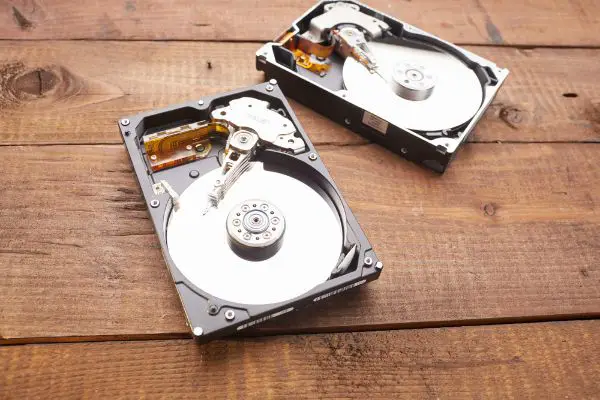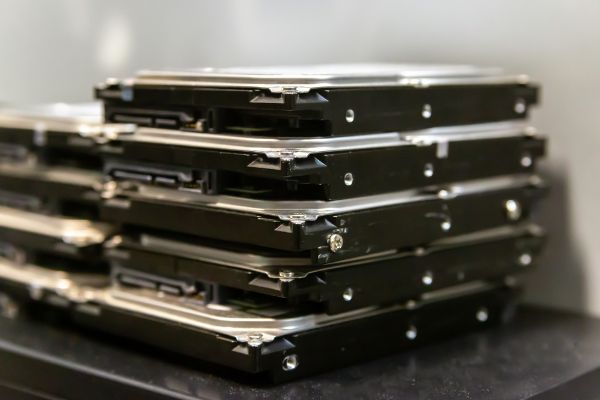Disclaimer: This post may contain affiliate links, meaning we get a small commission if you make a purchase through our links, at no cost to you. For more information, please visit our Disclaimer Page.
A typical hard disk drive is the main way that your computer is going to store information and files. In a mechanical drive, the platter will spin in order to read or bring up data as necessary. Most computers that you purchase in a pre-built state from the manufacturer are going to have a single hard drive.
The amount of data you can store on this drive will be limited to its capacity. However, there are ways that you might add more than one hard drive to your system, although this can depend on the case or system you are using. There can be multiple benefits to having more than one drive on a single computer, and they can account for more than just increased storage space.
We will go over how you might have more than one HDD on a computer, look at cases where you might not be able to, the various pros and cons of having more drives, and whether using more than one drive at once might slow down the computer. We can also look at specific operating systems, such as Windows 10, and go into how you might plug old drives into newer machines.
Table of Contents
Can You Have Multiple Hard Drives in a Computer?
In short, yes, it is almost always possible to put more than one hard drive in a single computer. There are a few specific requirements that your computer must meet first.
However, most of these are things that any modern desktop will meet already, and some laptops can as well. For any criteria that your computer does not meet already, you can usually purchase the things you need in order to get it up to spec quite easily. Here is a list of the basic things you’ll need to make sure that your computer has in order to support more than one drive:
1. Your computer’s motherboard needs enough device connections to support the new drive. In most cases, this means at least one free SATA port slot.
If you have a newer computer, its motherboard should be able to handle at least one other drive besides the one it is already supporting. Better motherboards will have several SATA slots. If you need more, you can purchase a card to put into the motherboard that has more slots for you to use.
2. A power supply that can handle the extra load of the additional drive. This is usually not a concern, but you can purchase an upgraded unit if it is. Similarly, you’ll need cords of sufficient length to handle the connections here, too.
3. Your computer’s case will need enough physical space inside in order to seat the new drive comfortably.
4. Along with enough space, you need proper mounting hardware to be able to secure the drive so that it is stable once you install it and close up the case. There are drive kits that should come with the appropriate things you need for the HDD of your choice. Some packages will also include an extra SATA cable that you will need.
5. Cooling units that are strong enough to take on the additional heat generated by a new hard disk. Again, there are larger, more powerful cooling units you can buy if you need to.
What Are Some Pros & Cons of Multiple Hard Drives in a PC?
Having more storage space for all your data needs is certainly nice. However, there are some other advantages that you might find out once you install additional drives into your system.
Conversely, though, there might be some things to watch out for that could make such options less desirable to you. All of these could depend on your setup or use cases for your computer, but we can take you through both ends of this spectrum in our subsections below.
Pros
1. Drives have increased in storage space as the years have gone by. However, it can be difficult to find the largest ones that the market offers.
Instead of looking for rarer huge drives, you can purchase multiples of HDDs that still have respectable storage space limits and combine them to get the number you need.
On a related note, buying two smaller drives to add up to one larger one could be more cost-effective for your budget.
2. Having multiple drives can increase your redundancy protocols, and this will go a long way toward giving you more options for data security.
Note that, for true data redundancy, it would be best to have mirrored drives that copy the same data. That way, your files are secure even if one drive fails. There are other considerations here, and it may be best to speak to a specialist in IT to get all of the details on this particular topic.
3. More drives might make it easier to use different operating systems on the same machine. You can use one drive to boot the system of your choice in its own environment or partition.
Furthermore, different drives can give you options for keeping track of, separating, and updating software programs that you might use for a large business.
4. More hard drives will mean more memory that you can allocate to the Windows virtual paging file. This might be helpful if you regularly run programs that need to allocate a large amount of virtual memory from the file in order to maintain smooth operations.
Cons
The cons really depend on your setup, and they can be less concrete than the advantages.
1. You would be limited by the physical size available to you. For desktops, you can increase the tower size, but laptops have limited space. However, even some laptops could take on another drive.
2. The costs may start to go up if you add several drives to one system.
3. As we touched on earlier, you may need an increased power supply to compensate for the multiple drives that are running. Usually, a standard supply can handle at least two drives.
4. Having several hard drives in one case could increase the noise levels quite a bit. The drives themselves will make noise, and you might need to add extra coolers or fans to keep everything working within acceptable temperature ranges.
How Many Hard Drives Can a Computer Have?
From the point of an operating system perspective, the number of hard drives you can have in a single system is pretty much limitless. From a more practical perspective, however, there are probably some limitations within which you will have to work.
Namely, it will depend on the number of applicable ports your motherboard has. You should be able to expand this number through the use of cards, but there is still a physical limitation on the number of supported drives that the board will be able to offer you.
This can vary by operating systems, but it is dependent on both drive letters and redirects or mount points. Mount points are directories or file systems that make more data available. In short, you can think of them as a way to further increase the number of drives you can use to store data.
How Many Hard Drives Can Windows 10 Support?
How many drives Windows 10 supports depends on how you set up your system. For this part, we will assume that you are working with as many ports as you desire, and that you have the hardware to support as many drives as you want. This includes motherboard compatibility, mounting hardware, physical space, and everything else that you might need.
In its most basic form, Windows 10 should be able to support up to 24 lettered drives on a single system. Neither A nor B would be available to you, but you will be able to name each drive using the remaining letters of the alphabet. With this method, many users will reach whatever amount of storage space that they might desire for their purposes.
If they want to go higher, there are ways to map more drives. Using what are known as logical mount points, you can map more drives to a particular folder for storage use. These folders are logical folders that match the appropriate drives. Similarly, you can map network drives to network folders as well.
Does Having Multiple Hard Drives Slow Down Computer?
Typically, using multiple hard drives should not slow down your computer. Each drive will use its own SATA port on the motherboard, and the use of any one of them should not affect any of the others. Having a proper power supply, adequate RAM, and other things are much more important considerations when it comes to adding more drives to a single system.
Can You Plug an Old Hard Drive Into a New Computer?
In most cases, you can plug an older drive into your newer machine. You may wish to do this if you need to retrieve files and important data from the old drive.
If your new computer has compatible interfaces, you should be able to plug it into the device the same way you would a current hard drive. If it does not, you can make use of an external enclosure to make the drive more like a USB drive that you can use to transfer files.
Note, however, that you can’t transfer actual software that first requires a setup and installation program to run in this way. You would need to have the installer ready on the new machine for this to work. For file retrieval, it should work well.
Conclusion
Multiple hard drives can vastly improve your storage space. They can also increase the virtual memory you might have access to on the paging file. Several smaller drives may be more economical than fewer of their larger cousins, and they are a good way to set up redundancies to protect sensitive data, too.


